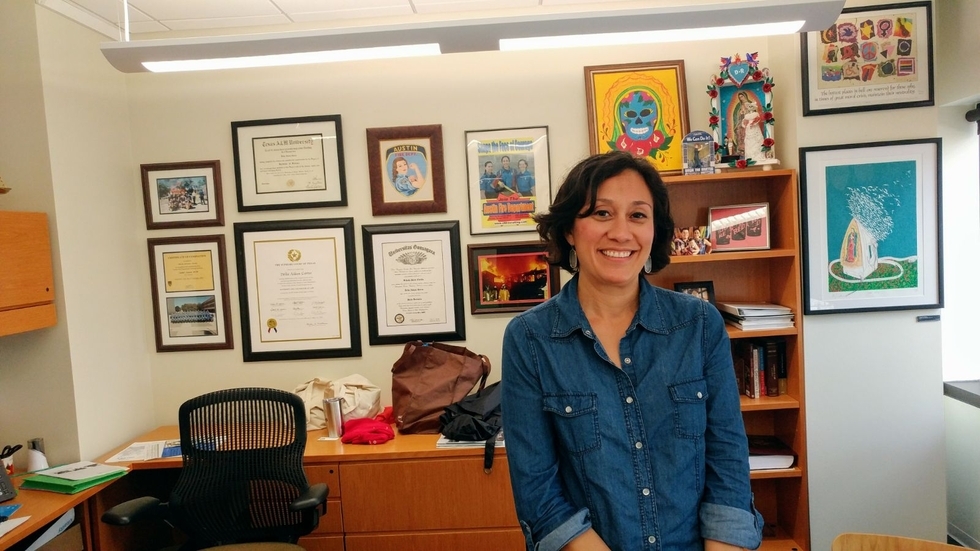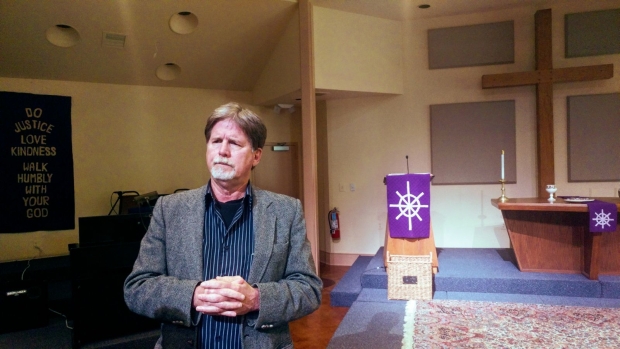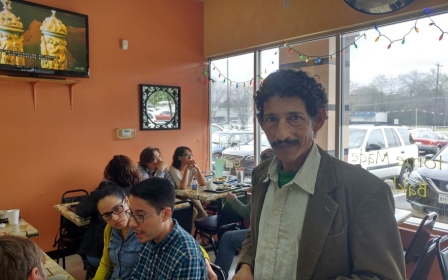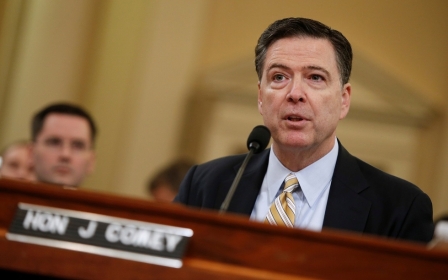In Texas, #sanctuarycities battle to protect immigrants

AUSTIN, Texas - In deep red Texas, where President Donald Trump beat Hillary Clinton by nine percentage points, groups and municipalities are battling for the right to protect immigrants from the federal government’s wrath.
Austin is the seat of Travis County, where sheriff Sally Hernandez has refused to detain undocumented immigrants based on the request of Immigration and Customs Enforcement (ICE) without a court order.
While Trump has vowed to pull federal funding from local governments refusing to enforce his crackdown on immigrants, it was Republican Texas Governor Greg Abbott who withdrew a $1.5m law enforcement grant from Travis County.
Here, at a crossroad where different levels of US government intertwine, the battle for the sanctuary movement is intensifying.
There is no set legal definition for the term “sanctuary”, whether it is a city or a college campus. The description has generally been used to describe municipalities that pass measures to give undocumented immigrants a sense of residential safety in the face of a federal crackdown.
In Austin, the Texas capital, rights organisations and city officials have expressed support for the sheriff, while activists have been establishing networks to make the city a place where immigrants can live with minimal fear.
'Welcoming city'
Austin councilwoman Delia Garza said she stands fully with Sheriff Hernandez’s decision.
She said Hernandez’s predecessor, Greg Hamilton, had considered it his office’s duty to detain people wanted by ICE, which stirred concern among residents. Hernandez ran for sheriff and won on an open platform of refusing to apprehend people without a court warrant, according to the councilwoman.
I’ve always found it ironic that the state gets mad at the federal government when it tries to encroach on it, but it’s okay when the state encroaches on local government. It just seems very hypocritical
- Delia Garza, Austin councilwoman
“I supported her, I voted for her, I think it’s the right thing to do,” Garza told MEE of Hernandez. “I don’t think it’s local law enforcement’s job to enforce immigration law. Local public safety [agencies] should be concerned with local public safety.”
“Austin defines itself as a welcoming city” where the police chief has decided not to get involved in immigration issues, the councilwoman added.
According to Elissa Steglich, an immigration law professor at the University of Texas in Austin, there are two competing definitions of sanctuary cities.
“One is a general commitment to welcome and ensure that undocumented immigrants feel just as part of the community as US citizens, that everyone is viewed as equal regardless of immigration status in terms of access to services,” Steglich told MEE.
The other is about cooperating with federal law enforcement on immigration issues, the professor said.
“This goes back to these mandatory requests from the Department of Homeland Security to detain someone who is in state custody or local county custody longer than the state or county has an interest in that person and would be able to legally hold that person otherwise,” she added.
Senate Bill Four
Councilwoman Garza voiced concern over proposed state legislation that would punish municipalities that do not work with the federal government on immigration enforcement.
Senate Bill Four (SB4) bans “sanctuary city” policies and requires all law enforcement agencies to cooperate with federal officials’ requests to hold individuals while ICE further investigates their immigration status.
“The bill would prohibit municipalities, counties, campus police from having any policy or practice that would limit collection of immigration information, and limit the communication of that information between that local enforcement entity and federal immigration authorities,” Steglich said.
“For example, campus police could not have a policy on the books that says ‘when encountering or making an arrest, or responding to a scene, don’t ask about immigration status because it’s not relevant’. Something like that would be prohibited by the legislation.”
While US conservatives have always loathed federal oversight and advocated for local control, immigration seems to be an exception. After all, Austin is home of the Texas State Capitol, whose lawn showcases a monument honouring the confederacy’s struggle against the federal government after president Abraham Lincoln’s emancipation of slaves in 1963.
“Died for state rights,” the monument reads.
Garza said the crackdown on the pro-immigrant movement is an assault on the concept of self-governance.
“I’ve always found it ironic that the state gets mad at the federal government when it tries to encroach on it, but it’s okay when the state encroaches on local government. It just seems very hypocritical,” she said.
Amid fear of losing funding at the local level because of the sanctuary or welcoming attitude, Garza said principles should matter, even to those not directly affected by the crackdown on immigration.
“We have to hold the line on some things that are important to us; we are a country of immigrants,” she told MEE. “That’s how bullies get their way - they push a little bit and they push a little bit. If we don’t hold the line on these core values that we feel are important, then I don’t know what the point of being a public servant or having conviction and values is… That’s not the America I want to live in.”
Garza said the city council’s abilities are limited when it comes to immigration, but beyond the rhetoric, Austin has passed “emergency funding” for non-profits that benefit immigrants.
The councilwoman said creating an atmosphere of fear among undocumented immigrants is “just bad public policy”, because it discourages people from turning to the police when they need help.
Resistance to bill
Indeed, last month, ICE agents arrested an alleged victim of domestic violence outside a courthouse in El Paso, Texas, after she had turned to the legal system for help.
By early March, more than 50 undocumented immigrants, including many in Garza’s district, had been detained in ICE raids.
“It’s heartbreaking when you think of the effect [of] families being torn apart, and families being in fear. I’ve heard of stories of families locking themselves in their rooms and not sending their children to school,” she said.
However, several groups, including the state Democratic Party, have organised opposition towards SB4.
Manny Garcia, the Texas Democratic Party’s deputy executive director, said more than 1,000 people have testified against the bill.
“Hundreds sat down and gave testimony against the bill while others sent in written testimony and signed up against the bill,” Garcia told MEE.
“We have heard from law enforcement officials in Texas’ largest cities who have said this is not the best way to keep people safe. They have said that they don’t want local police officers or sheriff deputies turned into immigration agents.”
Church sanctuary
Some faith leaders in Texas have been at the forefront of the sanctuary movement. Jim Rigby opened the doors of Austin’s St Andrews Presbyterian as a literal sanctuary for a Guatemalan asylum seeker and her son.
What the leadership in this country has done is make universal human rights and environmentalism partisan issues, which is insane
- Jim Rigby, pastor
Rigby said Washington’s policies have destabilised Central American nations and pushed people to flee to the southern US border.
“People come to our border and we view them as criminals,” Rigby told MEE. “But to me, this is like setting someone’s house on fire and then arresting them when they run to your backyard.”
He said many refugees have the “mistaken idea” that the United States believes what it says on the Statue of Liberty about welcoming those who seek freedom.
Rigby said the Trump administration is going through the lives of millions of people with a “fine tooth comb” to find stories in immigrant communities and paint the entire group as bad.
During his first speech to Congress, Trump announced Victims Of Immigration Crime Engagement (VOICE), a programme to specifically bring attention to the crimes of immigrants. The initiative had sparked comparisons with Nazi Germany, where the government would publish lists of criminal acts committed by Jews.
The pastor called the president’s approach a “disingenuous method” to demonise immigrants as rapists and criminals.
“That’s how Adolf Hitler made the Jews look bad,” Rigby told MEE. “You read Breitbart, it’s like every week, there’s something bad that an immigrant has done - this constant drumbeat.”
The pastor said people have a “moral obligation” to investigate the propaganda of their governments.
“The history has been shaped to make your country look innocent and make the scapegoats look bad,” he said. “A good human being has to be a global citizen, in addition to having local agency. I believe that’s what Christ would call us to do.”
Yet Evangelical Christians voted overwhelmingly for Trump. Rigby said for some Christians, nationalism and capitalism are more important than their own religion.
“When you believe in the invisible hand of the market, that’s a renunciation of everything Jesus taught,” the pastor told MEE.
He added that the government has turned some basic concepts into political issues to silence the victims.
“What the leadership in this country has done is make universal human rights and environmentalism partisan issues, which is insane,” he said.
Elaine Cohen, a Jewish American immigration advocate, said the US immigration system does not only need reform, but a “complete overhaul” to make it more humane.
Cohen became active in the Austin Sanctuary Network after witnessing the dire conditions at immigrant detention centres. She said the networks has succeeded in finding safe homes and “buying time” for a few asylum seekers.
'ICE is a bully'
She called for relentless, direct activism against immigration authorities.
“ICE is a big bully, and that’s where a lot of the campaigns are. When you send enough letters, enough people demonstrating, enough people throwing themselves in front of the ICE vehicles, that’s when they back down,” Cohen told MEE.
Referring to SB4, Cohen said the Texas Legislature “hates Austin”. She called the crackdown on sanctuary cities “scary and upsetting”.
While praising the “No Ban, No Wall” protests, Cohen said the real issue is “no deportation”.
She said sending immigrants and asylum seekers back to Central America could mean death at the hands of the police or drug cartels.
Cohen dismissed national security concerns associated with deportations and immigration restrictions. She said none of the 9/11 attackers came from the southern US border or the seven (now six) Muslim-majority countries in Trump’s travel ban.
On the contrary, she added, the US has trained the worst of the “bad dudes” in Central American militaries.
She said immigrants are just hard working people trying to feed their families, while providing much-needed services to the American public.
Asked about concerns that undocumented immigrants may be bringing drugs, Cohen said jokingly: “Nobody I know smokes anything that comes from Mexico.”
Middle East Eye propose une couverture et une analyse indépendantes et incomparables du Moyen-Orient, de l’Afrique du Nord et d’autres régions du monde. Pour en savoir plus sur la reprise de ce contenu et les frais qui s’appliquent, veuillez remplir ce formulaire [en anglais]. Pour en savoir plus sur MEE, cliquez ici [en anglais].





